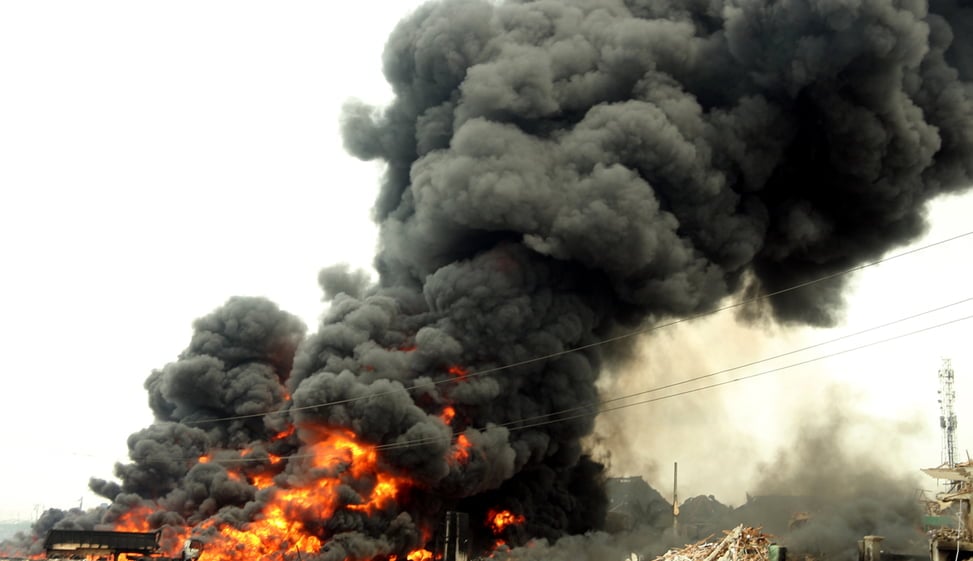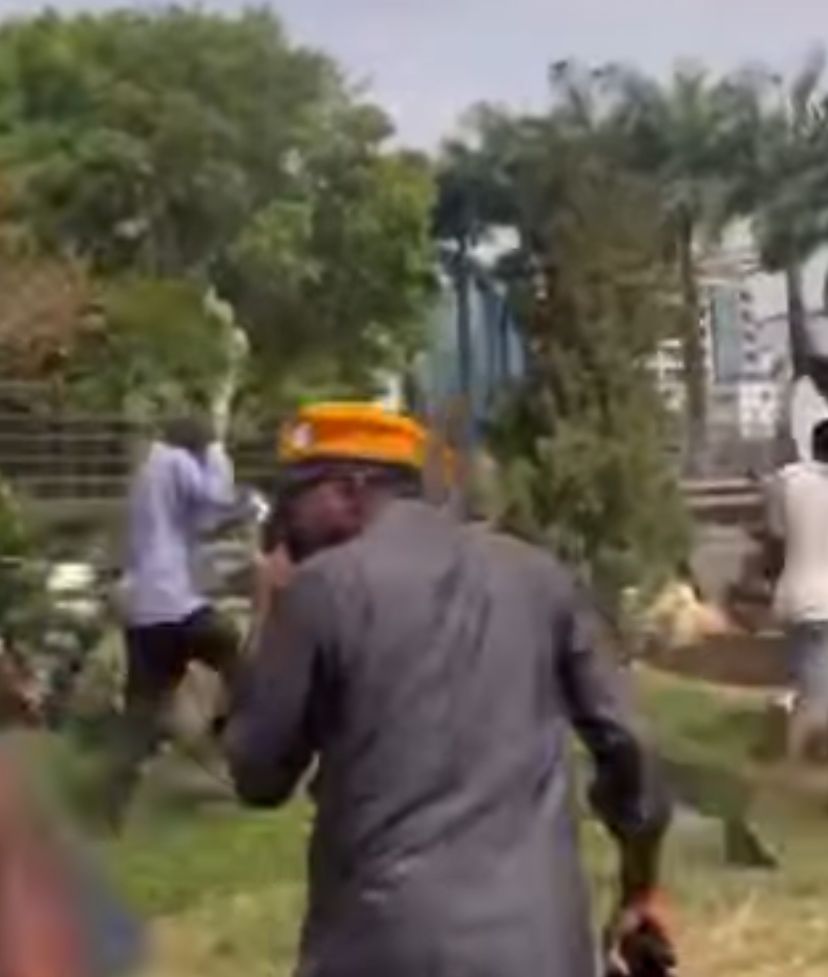Trending
The mega trade deal that has French farmers in uproar
Published
4 months agoon
By
Ekwutos Blog
As the ink was drying on one of the world’s biggest trade deals, signed in Uruguay this month, and hailed as a milestone for the global economy, anger was brewing thousands of miles away in France.
Under the agreement between the EU on one hand, and Argentina, Brazil, Paraguay and Uruguay on the other, tariffs will be greatly reduced and the amounts of imports and exports allowed will be increased.
The deal would affect almost 800 million people.
It comes as a marked contrast to Donald Trump’s plans to greatly increase protectionism when he returns to the White House next month.
The deal still needs to be approved by the 27 EU member states, and France is planning to block it, due to fears that it will harm its farming sector.
Alix Heurtault, a 34-year-old French farmer, says she is worried about her future if the planned agreement goes ahead.
“I fear that the deal will mean making ends meet becoming even more difficult for farmers like me,” she says.
As a result, she is crossing her fingers that the French government will be able to stop it.
The planned trade agreement will mean more South American beef, chicken and sugar coming to the EU, and at lower prices. While in the opposite direction, the likes of European cars, clothing and wine would have more access to the Mercosur zone.
For France to block the deal it will need to persuade at least three other EU countries, representing at least 35% of the total population to join it. Ireland, Poland and Austria are also opposed, but Italy will likely need to also come on board to achieve the required population quota.
And with the media giving very conflicting reports about Italy’s position, we’ll have to wait and see which way the Italians go when the vote is held some time in 2025.

European Commission President Ursula von der Leyen signed the deal with South American leaders, but it still needs to be ratified by EU member states
© Getty Images
In the meantime, French farmers are continuing to put pressure on Paris to not back down. French President Emmanuel Macron is listening, and has described the trade deal as “unacceptable in its current form”.
Ms Heurtault grows sugar beet, wheat and barley on a 150-hectare farm in the small village of Villeneuve-sur-Auvers located 60km (37 miles) south of Paris.
She says that the deal would see French farmers badly hit in order to help EU manufacturers. “It feels like we’re a bargaining chip. Farmers in the Mercosur countries [the name of the Argentina, Brazil, Paraguay and Uruguay block] have less restrictions regarding pesticides and lower labour costs.”
Ms Heurtault’s view is widely held across the French farming sector, which has been holding regular protests in recent months.
A few weeks ago some 200 farmers dumped bales of straw in front of the Grand Palais museum and exhibition centre in Paris.
They lit up red flares, and chanted slogans like “We are feeding you, show us some respect”.
The protest was held to coincide with an annual meeting of commodities importers and exporters taking place at the venue.
Stéphane Gallais, a cattle farmer and the national secretary of farmers’ union Confédération Paysanne, which had organised the event, explained why it was being held.
“Today’s demonstration is a stance against free trade, especially the EU-Mercosur agreement that we’ve been opposing since it was first discussed in the late 1990s,” he said.
While France is opposed to the trade deal, other EU nations, such as Germany, Spain and Portugal are strongly in favour of it.
Proponents welcome the fact it would be a marked contrast to Trump’s threats of increased protectionism.
“It would be a good signal at a time when we have movement in the opposite direction towards economic fragmentation and protectionism, especially with free-trade sceptic US President Donald Trump re-elected,” says Uri Dadush, a research professor for trade policy at the University of Maryland in the US.
Prof Dadush adds that while European farmers will be negatively impacted, he says this will be very limited.
“The deal is a threat for European farmers, as the world’s most competitive agricultural sector gets access to their market, but we’re talking about a tiny amount of liberalisation spread out over a long period of time,” he says.
He points out that under the agreement the Mercosur nations would still have limits on what they can export to the EU. Such as their proposed initial increased annual quota of beef exports still only accounting for less than 1% of EU consumption of the meat.
Prof Dadush adds that “the deal is an opportunity to push for much needed market-orientated reform in the heavily-subsidised EU agricultural sector, and Mercosur’s highly-protected factory sector”.
Chris Hegadorn, adjunct professor for global food policies at Paris-based university Sciences Po, and former secretary of the UN’s Committee on World Food Security, says the agreement would overall be beneficial to Europe – including its farmers.
“It obviously depends on the subcategory you’re looking at, but French cheese and wine producers will benefit,” he says.
He adds that it will also improve health and environmental standards in the Mercosur countries, and increase ties with the EU at a time when “China is also trying to get a foothold in Latin America”.
But David Cayla, lecturer for economics at Angers University in western France and member of the left-wing collective “The Dismayed Economists”, doubts the EU will be able to enforce higher standards in Latin American countries.
“It’s impossible to control their implementation,” he says. “Our farmers will only face increased competition from countries with a better climate and more fertile soils.
“But we need to protect European agriculture – that’s also a question of food sovereignty,” he emphasizes, adding that the Covid-19 pandemic showed how quickly worldwide supply chains could collapse in times of crisis.
You may like
Trending
Lagos: Cause of Ijora-Badia explosion revealed
Published
6 hours agoon
April 7, 2025By
Ekwutos Blog
Lagos State Fire and Rescue Service has revealed the real cause of the explosion that rocked the Ijora-Badia area of Lagos on Sunday afternoon, injuring no fewer than 15 people.
According to a statement by the Director of the Lagos State Fire and Rescue Service, Margaret Adeseye, the explosion occurred around 4:10 p.m. inside a mini shop stocked with 25kg gas cylinders.
The shop, located within a bungalow that housed 15 self-contained rooms and seven other shops, reportedly had five gas cylinders at the time of the incident.
Adeseye attributed the explosion to the mishandling of gas, which caused a leak that was ignited by a nearby flame.
“It was a case of poor handling of gas products, which unfortunately allowed gas to escape and come in contact with a flame. This triggered the explosion,” she confirmed.
The resulting fire, she said, was promptly extinguished by a team of firefighters from the Sari Iganmu Fire Station, with support from the Lagos State Emergency Management Agency, LASEMA, the Lagos Neighbourhood Safety Corps, and LASAMBUS.
While no fatalities were recorded, 15 persons sustained varying degrees of burn injuries.
Adeseye noted that several victims were treated with first aid on-site, while others were taken to nearby hospitals for further medical care.
She also assured residents that the area has since been secured and normalcy restored.
Trending
Take-It-Back protesters scamper for safety as police fire tear gas during protest in Abuja.
Published
6 hours agoon
April 7, 2025By
Ekwutos Blog
Officers of the Nigeria Police Force dispersed protesters with tear gas in the Maitama area of Abuja.
The protesters, who had gathered on Monday, April 7, scattered in different directions as the tear gas canisters were fired in their midst.
The protest is part of a nationwide demonstration spearheaded by the Take-It-Back Movement and other civil society organisations.
Key among the concerns raised by the organisers are the alleged misuse of the Cybercrime Act, the worsening economic hardship in the country, and what they described as a “state of emergency” in Rivers State.
The demonstrators carried placards bearing inscriptions such as “Stop the Repression” and “Let Us Breathe”.
Human rights activist Omoyele Sowore was also present at the protest ground.
Trending
How I caught lots of people’s wives with big men, governors – Ali Baba
Published
7 hours agoon
April 7, 2025By
Ekwutos Blog
Veteran Nigerian comedian, Ali Baba, has revealed that he has caught numerous wives of his friends and associates engaging in extramarital affairs with governors and wealthy politicians.
He made this revelation during an appearance on the Outside the Box podcast.
Speaking candidly about the unsavoury activities prevalent among the nation’s elite, the comedian recounted a particular encounter in which he saw the wife of an associate at the residence of a state governor.
He said: “I have been in the houses of a lot of big men—like governors and the rest—and I see wives of a lot of people that I know doing things, and I greet, ‘How are you? How is everything?’
“And then those guys would do their philandering, tap her bum and say, ‘Go back inside, I’m not finished with you,’ and she went back inside. Then I ran into her at an event, and her husband said, ‘Oh, how are you? Meet my wife.’ I responded, ‘Oh madam, it’s a pleasure. I haven’t seen you in five years. Where have you been?’ And she’s like, ‘I’ve been around, good to see you.’
“When she sees me somewhere after, she calls me and says, ‘Ali, thanks,’ I say, ‘It’s okay.’”
Ali Baba’s account casts a sharp light on the often unspoken indiscretions that occur behind closed doors in high society.
Credit: Blaze 91.5 FM

We are in control of NNPP – Kwankwaso’s loyalists snub court ruling

FAAN ends physical luggage checks at Lagos Airport

IMO DEPUTY SPEAKER, IWUANYANWU DONATES 500 CAPACITY TOWN HALL BUILDING TO NWANGELE COMMUNITY, SALUTES GOV. UZODIMMA FOR ENABLING PROJECTS EXECUTION
Trending

 Trending6 months ago
Trending6 months agoNYA demands release of ‘abducted’ Imo chairman, preaches good governance
- Business6 months ago
US court acquits Air Peace boss, slams Mayfield $4000 fine

 Politics6 months ago
Politics6 months agoMexico’s new president causes concern just weeks before the US elections
- Entertainment6 months ago
Bobrisky transferred from Immigration to FCID, spends night behind bars
- Entertainment6 months ago
Bobrisky falls ill in police custody, rushed to hospital

 Politics6 months ago
Politics6 months agoRussia bans imports of agro-products from Kazakhstan after refusal to join BRICS

 Politics6 months ago
Politics6 months agoPutin invites 20 world leaders
- Politics1 year ago
Nigerian Senate passes Bill seeking the establishment of the South East Development Commission.

